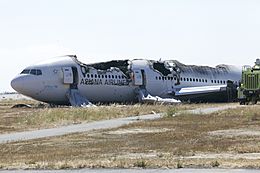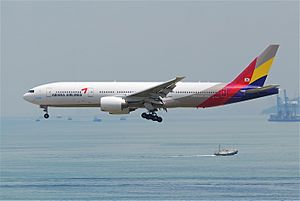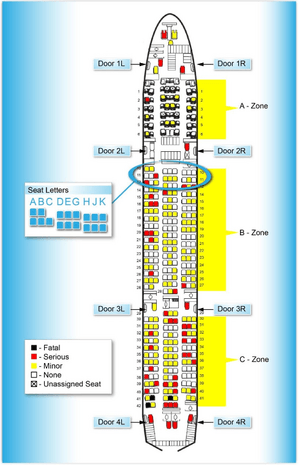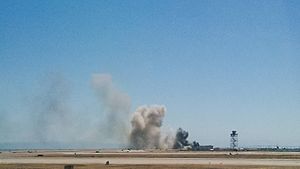Asiana Airlines Flight 214 facts for kids

The plane after it crashed
|
|
| Accident summary | |
|---|---|
| Date | July 6, 2013 |
| Place | San Francisco International Airport 37°36′48″N 122°21′53″W / 37.61333°N 122.36472°W |
| Passengers | 291 |
| Crew | 16 |
| Injuries (non-fatal) | 182, at least 5 very serious |
| Fatalities | 3 |
| Survivors | 304 |
| Aircraft type | Boeing 777-200ER |
| Airline/user | Asiana Airlines |
| Registration | HL7742 |
| Flew from | Incheon International Airport |
| Flying to | San Francisco International Airport |
Asiana Airlines Flight 214 was a passenger airplane trip. It flew from Incheon International Airport in South Korea to San Francisco International Airport in the United States. On July 6, 2013, the plane had a crash landing at San Francisco International Airport.
There were 307 people on board, including 291 passengers and 16 crew members. Sadly, three people died in the accident. Two passengers died during the crash, and another passenger passed away later due to injuries. Also, 182 people were hurt.
As the plane was coming in to land, its engines were not powerful enough. The plane was flying much slower than it should have been. Just before the crash, the pilots tried to take off again, but it was too late.
The airplane that crashed was a Boeing 777-200ER. Asiana Airlines had been using it since March 2006. This crash was the first time anyone had died on a Boeing 777 aircraft.
Contents
What Kind of Plane Was It?
The plane used for Flight 214 was a Boeing 777-28EER. Its special number was HL7742. It had two powerful Pratt & Whitney PW4090 engines. Asiana Airlines received this plane in March 2006. The aircraft had flown for about 36,000 hours, which is a lot of flying time.
What Happened During the Crash?
On July 6, 2013, Flight 214 left Incheon International Airport (ICN) in South Korea. It took off a bit late, at 5:04 p.m. Korean time. The plane was supposed to land at San Francisco International Airport (SFO) at 11:04 a.m. Pacific time.
At 11:26 a.m. Pacific time, the plane crashed while landing at San Francisco Airport. It landed before the start of runway 28L. The plane hit a seawall in San Francisco Bay. Pilots usually want to approach the runway at a speed of 137 knots. However, the plane's flight data recorder showed that it was flying slower than this. The engines were also not working hard enough during the landing approach.
When the plane crashed, both engines and the tail section broke off. People who saw the crash said there was a big flash of fire. Minutes later, there was a second, larger explosion. Passengers used Evacuation slides to get off the plane quickly. Even though the plane was badly damaged, many people were able to walk away on their own.
The special landing system for runway 28L, called the Instrument Landing System (ILS), was not working. It had been out of order since June 11. This meant pilots had to land the plane mostly by hand, without much help from the autopilot. The clear weather made this easier. Chesley Sullenberger, a famous pilot, said that investigators would look into whether the broken ILS played a part in the crash.
This was only the third serious crash in Asiana's history. It was also the first serious airliner crash in the United States since 2009.
Who Was On Board?
There were 307 people on the plane. This included 291 passengers and 16 crew members. People from many different countries were on Flight 214.
| Nationality | Passengers | Crew | Total |
|---|---|---|---|
| 141 | 0 | 141 | |
| 77 | 14 | 91 | |
| 64 | 0 | 64 | |
| 10 | 0 | 10 | |
| 7 | 0 | 7 | |
| 6 | 0 | 6 | |
| 4 | 0 | 4 | |
| 3 | 0 | 3 | |
| 3 | 0 | 3 | |
| 3 | 0 | 3 | |
| 3 | 0 | 3 | |
| 3 | 0 | 3 | |
| 2 | 0 | 2 | |
| 0 | 2 | 2 | |
| 1 | 0 | 1 | |
| 1 | 0 | 1 | |
| 1 | 0 | 1 | |
| 1 | 0 | 1 | |
| 1 | 0 | 1 | |
| 1 | 0 | 1 | |
| 1 | 0 | 1 | |
| 1 | 0 | 1 | |
| 1 | 0 | 1 | |
| 1 | 0 | 1 | |
| 1 | 0 | 1 | |
| 1 | 0 | 1 | |
| Total | 291 | 16 | 307 |
There were four pilots on the plane. The pilots flying when the crash happened were Lee Jeong-min and Lee Kang-kook. Lee Jeong-min had flown for over 12,000 hours. Lee Kang-kook had flown for almost 10,000 hours. He was still training to fly the Boeing 777. This was his first time landing a 777 at San Francisco. However, he had landed a different type of plane there before. Lee Kang-kook only had 43 hours of experience flying the 777 before the crash.
Among the Chinese passengers were 70 students and teachers. They were traveling to the United States for summer camp. Many of these students were from Jiangshan High School. They were traveling together as a group.
What People Saw and Heard
Some passengers noticed that the plane was very close to San Francisco Bay as it came in to land. They said water splashed up when the engines tried to speed up just before the crash.
When the plane hit the ground, oxygen masks dropped down right away. After the plane stopped moving, some passengers saw sparks inside the cabin.
Right after the crash, the pilots first told the flight crew not to help passengers leave the plane. But later, the pilots told them to evacuate, and the crew acted quickly. The crew also helped passengers who could not get out on their own. One pilot even carried a passenger with an injured leg.
A flight attendant said that many Chinese passengers did not understand the evacuation instructions at first. This was because of a language difference.
During the evacuation, a fire started inside the plane, near the middle. One of the pilots put out this fire.
Two of the emergency slides shot into the cabin instead of outside. One slide blocked an exit and almost hurt a flight attendant. A pilot used an axe to burst it. The second slide went towards the middle of the plane where there was a fire. It trapped another flight attendant, but a pilot used a knife to burst it.
Some passengers sitting at the back of the plane got out through the large hole where the tail had broken off.
The Investigation
The National Transportation Safety Board (NTSB) started an investigation into the crash. A team from the NTSB went to San Francisco. The CEO of Asiana Airlines said they believed there were no engine or mechanical problems with the plane. Investigators think the plane was too low when it came in to land and hit the seawall. The NTSB also said it looked like the pilots were flying too slowly.
About 4 seconds before the crash, a warning sound called a stick shaker could be heard. This sound warns pilots that the plane might stall. This was heard on the cockpit voice recorder. The crew tried to take off again just 1.5 seconds before the plane hit the ground. The engines seemed to be working fine at that time.
On July 7, 2013, NTSB investigators found the flight data recorder and cockpit voice recorder. These "black boxes" were sent to Washington, D.C. to be studied. The NTSB confirmed that the pilots tried to stop the landing and take off again very close to the crash.
The local official in charge of deaths, Robert Foucrault, looked into the deaths. He and a fire department official said that one of the girls who died might have survived the crash itself. However, she passed away later due to injuries.
After the Crash
No one knew the exact cause of the crash right away. This was the first time anyone had died on a Boeing 777 aircraft.
The airport was closed for about five hours after the crash. Flights that were supposed to land in San Francisco had to go to other airports. Some planes landed in Sacramento, Los Angeles, and Seattle. Later, some runways at San Francisco Airport opened again. However, the runway where the accident happened stayed closed for a while.
Asiana Airlines still flies from Seoul to San Francisco. But after the accident, the flight number was changed to 212.
Images for kids
-
HL7742, the plane involved, landing at Hong Kong Chek Lap Kok International Airport, in 2011
See also
 In Spanish: Vuelo 214 de Asiana Airlines para niños
In Spanish: Vuelo 214 de Asiana Airlines para niños
 | Percy Lavon Julian |
 | Katherine Johnson |
 | George Washington Carver |
 | Annie Easley |














